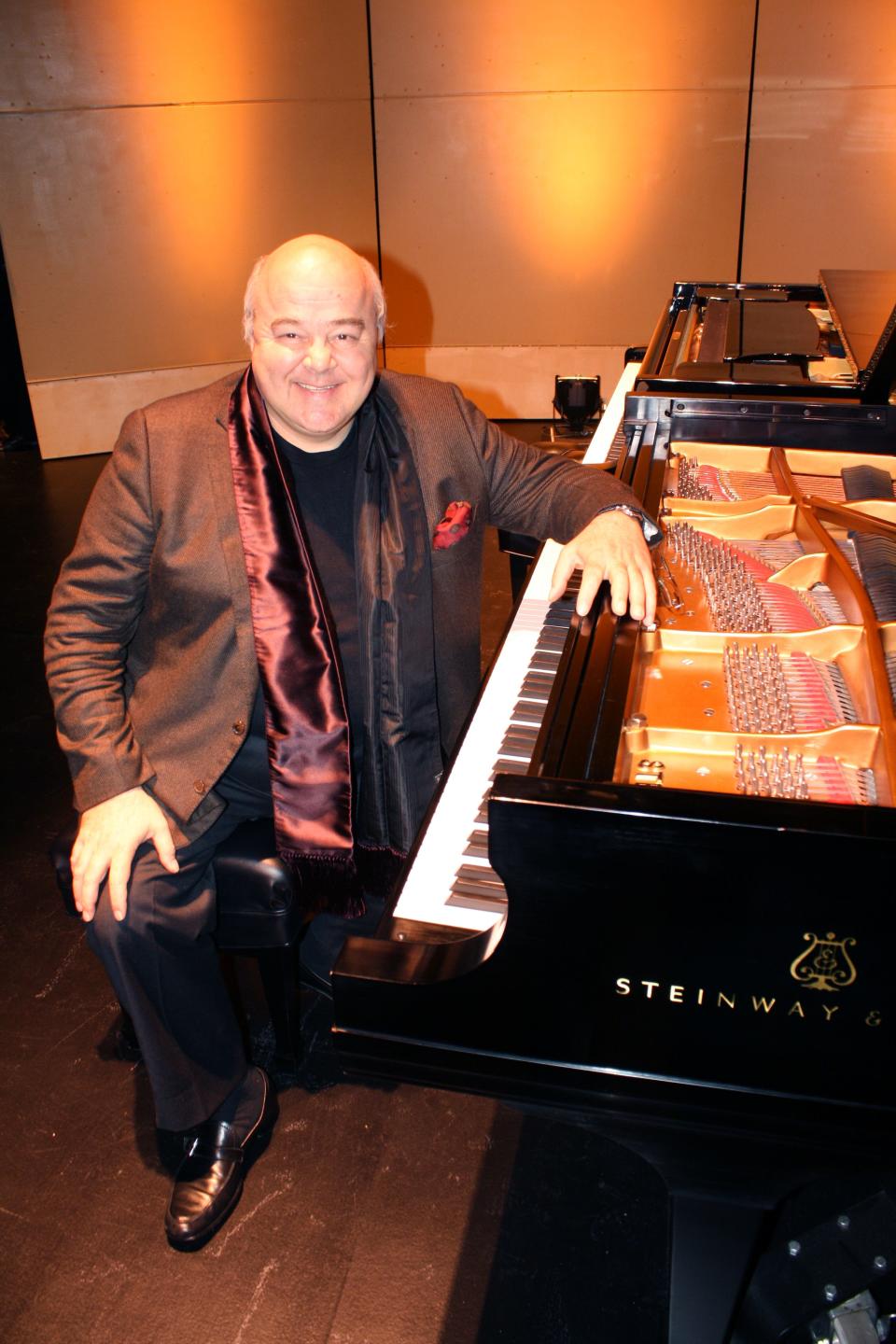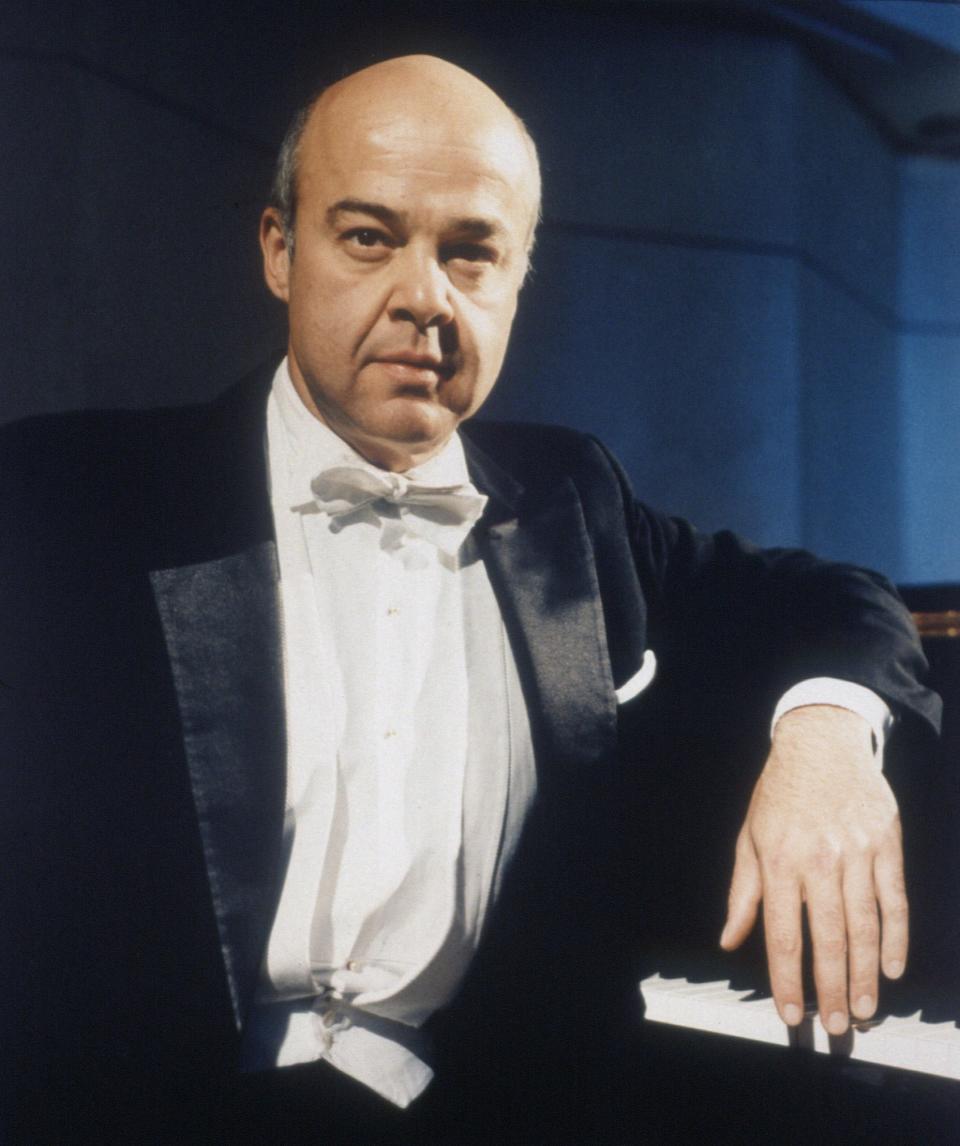WNIT Television kicks notes Toradze’s way in 2009 documentary about the pianist
- Oops!Something went wrong.Please try again later.
Editor's note: This story originally appeared in The Tribune on Dec. 6, 2009. The Tribune is reprinting it following Alexander Toradze's death May 11, 2022.
Early in “Kicking the Notes the Toradze Way,” a clip from Alexander Toradze’s performance at the 1977 Van Cliburn International Piano Competition plays on the screen, followed by the announcement that he has lost to Steven De Groote.

The pianist asked filmmaker Linda Schaller to find and include the scene, which ends with Toradze’s genuine hug in congratulations to De Groote.
“That’s how I ended up in this country,” he says by telephone from Tampere, Finland, while on tour of Europe and the Far East. “I don’t think we’d be talking or I’d be in America if I won that competition.”
His second-place finish at the Cliburn, Toradze says, left him feeling unfilled and has served to motivate him beyond complacency, a lesson he attempts to instill in his students as the founder and director of the Toradze Piano Studio at Indiana University South Bend.
“If something comes that makes me happy, I am immediately alerted not to trust this feeling,” he says. “It’s only temporary. … The biggest benefit I get out of my piano playing is not from my best performances, by my standards, but the worst ones that serve as an important jolt, a reminder that maybe I’ve been sleepy the last few weeks. I tell my players not to be afraid to fail, because sometimes that moment can give you more juices and vitamins than some astonishing triumph.”
Born in Tbilisi, Georgia, in 1952, Toradze grew up in an artistic home. His father was a leading 20th century Georgian composer, while his mother was a Georgian film star.
Toradze graduated from Moscow’s Tchaikovsky Conservatory in 1978, and in 1983, while on tour with the Bolshoi Symphony Orchestra of Moscow, he requested asylum at the American Embassy in Madrid.
“Kicking the Notes the Toradze Way” focuses on the pianist’s musical development and career from his childhood spent listening to the Soviet-prohibited Voice of America and its “Jazz Hour” to his defection, from his concert career to his founding of the Toradze Piano Studio in 1991 and its growth.
Produced locally by WNIT Public Television and executive produced by Angel Hernandez, WNIT’s vice president of production, the documentary includes interviews with conductors Valery Gergiev and Esa-Pekka Salonen, two of Toradze’s most frequent collaborators, and with his former and current students. Footage of Toradze — a fiercely physical and emotional musician who traces much of his style to the freedom he heard as a child in American jazz — in performance serves as a chorus to the interviewees.
“Besides them presenting my growing up in Georgia and Russia, it also truly represents my life and Toradze Piano Studio,” he says. “It shows our very austere, serious side as well as our playful side, including soccer playing and wine making and endless parties, but the core of that is making music to the best of our abilities. I think the documentary is a snapshot. It cannot be the full, long story, but it is a snapshot of different times of my life and it’s pretty true.”

The film also includes return visits to Toradze’s childhood home in Tbilisi.
“As much as (South Bend) is our home,” he says, “there are still other roots that are still significant.”
The Georgian footage also includes a visit with Toradze’s mother, who had been bedridden with illness for six months prior to the interview at her home. At first, Toradze declined to be interviewed at home.
“Then all of a sudden, I realized my mother is an actress and has been since she was 13 years old,” he says. “We discussed this with my sister, who said, ‘Why don’t you use this to inspire her to get in shape and get dressed and put on makeup?’ … The moment the cameras started to roll, she was directing where the lights should be. This was an extremely cute moment. She came to life.”
The Georgian visit also includes a visit to the grave of Toradze’s father, who died Nov. 7, 1983, approximately three months after his son’s defection.
“My father’s death was a public event, except for me,” he says. “Thousands of people came to his wakes and funeral. The moment I learned, it was three weeks after he died.”
On the phone, Toradze reveals that he has a tape of his last conversation with his father, a recording he made of a telephone call just days before his father’s death.
“I knew, of course, that my home was tapped and everything recorded, and I wanted my own recording of our conversations,” he says. “I knew my conversations would be recorded by KGB so I pressed my own button.”
A day later, the KGB questioned Toradze’s father all day long, and three days after that, he died unexpectedly.
“The difficulty is that he has to give me his inner approval without saying it because, of course, he knows he’s being taped,” Toradze says about their final conversation, their only one after the son’s defection. “I listened to this tape only once in 20 years, because it’s too much. I remember the underlying idea is, ‘You did what you did. Now behave accordingly and be an honorable person to your countries, Georgia and Russia.’ He’s happy I’m here; he just doesn’t want me to trash my country as every other dissident and defector has.”
In the film and on the phone, Toradze makes no attempt to mask the conflicting and deep feelings his father’s death causes him, and his voice cracks while discussing it.
“It has been both public and private,” he says. “I will never be able to take this huge load of blame off myself for that death. I don’t think he would die that soon if I had not moved to this country, because I don’t think he would be called to KGB for all-day questioning.”
Toradze, however, says that’s what happened and he must deal with it as he can.
“That’s why every meaningful action, musically speaking, that I take, I ask his forgiveness,” he says. “Revisiting the death of my father is a daily occurrence for me. It’s almost as if I have to justify his sacrifice for the mutual goal of serving music, serving our family and also serving young people, whom he loved dearly, his students, and so do I love mine.”
This article originally appeared on South Bend Tribune: Pianist Alexander Toradze the subject of 2009 WNIT documentary
